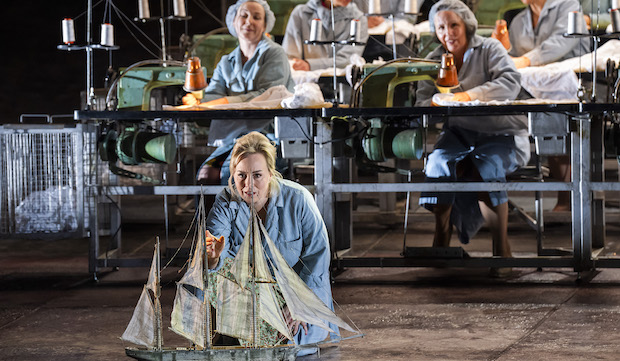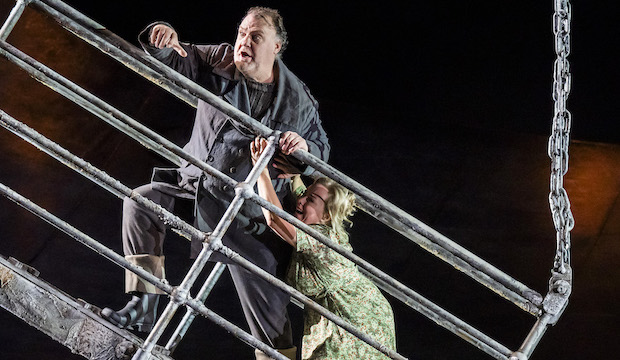The Flying Dutchman, Royal Opera House review ★★★★★
Wagner's windswept opera is revived with a new cast and stirring chorus work
The chorus excels in The Flying Dutchman at Covent Garden. Photo: Tristram Kenton
Passenger ships today are like floating tower blocks, but when the composer Richard Wagner and his first wife, Minna, set out for London from the Baltic coast their little vessel, Thetis, pitched and rolled dreadfully, taking nearly a month to cover a one-week journey.
'When at last we reached London Bridge, this incredibly crowded centre of the greatest city in the world, and set foot on land after our terrible three weeks' voyage, a pleasurable sensation of giddiness overcame us as our legs carried us staggering through the deafening uproar,' Wagner recalled.
A few minutes up the road from the point at which the couple disembarked, at the Royal Opera House, the opera partly inspired by that taxing voyage, The Flying Dutchman, has a suitably tempestuous opening. As Wagner's churning orchestral music whips up a storm, rough winds billow through dark skies, rain pours down, and only the nearing lighthouse speaks of dry land ahead.

Elisabet Strid as dreamy Senta. Photo: Tristram Kenton
Braving these seas are two vessels, one on a regular crossing, the other captained by a sailor doomed to sail for eternity, unless he is released by true love. Tempted by the Dutchman's great wealth, the unsavoury skipper Daland takes the cursed man home, please with this match for his daughter, Senta. The young woman herself is in love with the legend of a roaming seaman, and falls for the Dutchman when he appears in real life.
This simple story, elaborately and lengthily told is an entry-level Wagner opera, with memorable melodies and exciting orchestration. In this revival of Tim Albery's 1960s-set production, nautical rope-noodling and a deal of heave-ho is hugely enhanced by the painterly lighting of David Finn.
There are two notable Covent Garden debuts: Senta is sung with iceberg clarity and edge by the Swedish soprano Elisabet Strid, and American-Finnish tenor Miles Mykkanen is sonorous and likeable as the affable Steersman. For many, the star of the show will be bass-baritone Bryn Terfel, giving a perhaps suitably ghostly performance as the Dutchman on second night. I wasn't convinced Senta would fall for this hollow figure, but then her faithful and uninteresting suitor Erik, stoically sung by tenor Toby Spence, is no great catch either.

Bryn Terfel as the Dutchman and Elisabet Strid as Senta. Photo: Tristram Kenton
Out and out stars of the evening were the Royal Opera Chorus, every individual a personality, but every ensemble number sung with unity and character. This amazing body of men and women is chorus director William Spaulding's brilliant 'instrument', and that instrument gave a virtuoso performance.
For Henrik Nánási, conducting, the Orchestra of the Royal Opera House was on top form. The cor anglais solo in the overture was a highlight of the evening – and that was only two minutes in.
The Flying Dutchman is sung in German with English surtitles. Further performances are on 9, 11, 13, 16 March. Click here to book
'When at last we reached London Bridge, this incredibly crowded centre of the greatest city in the world, and set foot on land after our terrible three weeks' voyage, a pleasurable sensation of giddiness overcame us as our legs carried us staggering through the deafening uproar,' Wagner recalled.
A few minutes up the road from the point at which the couple disembarked, at the Royal Opera House, the opera partly inspired by that taxing voyage, The Flying Dutchman, has a suitably tempestuous opening. As Wagner's churning orchestral music whips up a storm, rough winds billow through dark skies, rain pours down, and only the nearing lighthouse speaks of dry land ahead.

Elisabet Strid as dreamy Senta. Photo: Tristram Kenton
Braving these seas are two vessels, one on a regular crossing, the other captained by a sailor doomed to sail for eternity, unless he is released by true love. Tempted by the Dutchman's great wealth, the unsavoury skipper Daland takes the cursed man home, please with this match for his daughter, Senta. The young woman herself is in love with the legend of a roaming seaman, and falls for the Dutchman when he appears in real life.
This simple story, elaborately and lengthily told is an entry-level Wagner opera, with memorable melodies and exciting orchestration. In this revival of Tim Albery's 1960s-set production, nautical rope-noodling and a deal of heave-ho is hugely enhanced by the painterly lighting of David Finn.
There are two notable Covent Garden debuts: Senta is sung with iceberg clarity and edge by the Swedish soprano Elisabet Strid, and American-Finnish tenor Miles Mykkanen is sonorous and likeable as the affable Steersman. For many, the star of the show will be bass-baritone Bryn Terfel, giving a perhaps suitably ghostly performance as the Dutchman on second night. I wasn't convinced Senta would fall for this hollow figure, but then her faithful and uninteresting suitor Erik, stoically sung by tenor Toby Spence, is no great catch either.

Bryn Terfel as the Dutchman and Elisabet Strid as Senta. Photo: Tristram Kenton
Out and out stars of the evening were the Royal Opera Chorus, every individual a personality, but every ensemble number sung with unity and character. This amazing body of men and women is chorus director William Spaulding's brilliant 'instrument', and that instrument gave a virtuoso performance.
For Henrik Nánási, conducting, the Orchestra of the Royal Opera House was on top form. The cor anglais solo in the overture was a highlight of the evening – and that was only two minutes in.
The Flying Dutchman is sung in German with English surtitles. Further performances are on 9, 11, 13, 16 March. Click here to book
TRY CULTURE WHISPER
Receive free tickets & insider tips to unlock the best of London — direct to your inbox
| What | The Flying Dutchman, Royal Opera House review |
| Where | Royal Opera House, Bow Street, Covent Garden, London, WC2E 9DD | MAP |
| Nearest tube | Covent Garden (underground) |
| When |
01 Mar 24 – 16 Mar 24, Six performances, start times vary. Running time 2hr 20min with no interval |
| Price | £47-£210 |
| Website | Click here for details and booking |